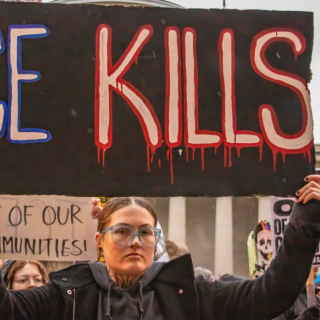Advertisement
Never in the history of First Ladies’ memoirs has there been a book so eagerly awaited as the one written by Michelle Obama. When Becoming hit the stores on November 13, 2018, it took only a week for the book to rocket to No. 1 in the New York Times Book Review, and is still a top ranked book in a dozen countries. According to Crown Publishing, more than six million units in all formats and editions have been sold in the U. S. and Canada, andBecoming has been translated into forty-four languages. The hardcover version of Becoming has sold more copies than any other nonfiction hardcover book published since 2007; it has sold more copies in 2018 than any other book published that year.
Mrs. Obama embarked on a tour that took her throughout the United States and Europe where she spoke in sold out venues; additional dates were added in the last several months. She has been met with rapturous crowds that are more common for rock stars than authors.
The book is divided into three sections. Becoming Me is about her family history and background, and growing up on the south side of Chicago. Obama is a descendant of slaves, and a granddaughter of the Great Migration. In her youth, the neighborhood was mostly working class. Her father, Fraser Robinson III, went to work every day at the city water plant. Not even multiple sclerosis slowed him down; he never missed a day at work until he was hospitalized a few weeks before his death. Marian Robinson was a stay-at-home mom. Money was tight, but it helped that they lived on the top floor of a building owned by Mrs. Robinson’s fastidious and exacting Aunt Robbie. (I suspect every black person has an Aunt Robbie.) There was only one bedroom, which their parents claimed. Michelle and her brother, Craig, partitioned the living room with a homemade folding door so that each of them had their own space, but could still talk far into the night.
Although she had a halcyon childhood–her husband said they were the African American version of Leave it to Beaver–she was painfully aware from a young age of the sacrifices that her parents were making on behalf of her and Craig, and of how some of her older relatives had their hopes crushed by northern segregation, which was almost as bad as it was down south. She worked hard in school, and became eligible to attend a magnet school with a commute of several hours a day. They ate dinner each night as a family, and often played board games. Mrs. Robinson taught her children to read, so when they entered to school, they would be ready. During the week there were trips with their mother to the library and museums, and she fondly recalled the Sunday drives in her father’s Buick 225, in those days referred to as a Deuce and a Quarter. They often drove through well off parts of the city–places where black people were neither expected nor welcome.
In spite of nay sayers, she followed her brother, Craig, to Princeton University. Her roommate was a white girl whose mother quickly had her transferred to another room. She didn’t learn about the reason until a news story that was written during her husband’s 2008 presidential campaign. She studied hard, made lifelong friends, and began hanging out at the Third World Center, where African American students congregated to center themselves at mostly white Princeton.
Obama makes it clear that she had planned her life to the nth degree. It was a series of checkpoints that she assiduously crossed off as she completed them. There was no room for happenstance, changing her mind, and definitely, no room for falling in love. By the end of Becoming Me, Obama had graduated from college and law school, was driving a Saab, and working as a junior associate at the law firm of Sidley and Austin when she was charged with mentoring a summer intern named Barack Obama.
In the second section of the book, Becoming Us, we see heartbreak and happiness. Michelle lost her dear friend, Suzanne, to cancer much too young. Her beloved father fell gravely ill, was briefly hospitalized, and died. The loss of her father hit her extremely hard. He was her ballast; because of his sacrifices–and those of her mother–she and her brother, Craig had choices in life. “Everything that I think about and do is shaped around the life I lived in that little apartment in the bungalow that my father worked so hard to provide for us.” She struggled with her profession and seriously began to question her purpose in life. And Obama flunked the bar exam–the first time she had ever failed a test. Even now, the reader can tell it still stings.
Yet there was so very much to be happy about in this period of her life. Barack’s funny proposal caught her off guard, but she quickly accepted. They bought a condo, got married, and settled into the blissful rhythm of their new life together. She had a satisfying job at city hall, working with Valerie Jarrett. Barack had a job at a prominent law firm, taught law school at night, and was elected to the Illinois state senate in 1996.
Their marriage was not all clear sailing, however. He had accepted a $40,000 advance from a publisher to write what became Dreams of My Father, but missed the deadline. The publisher wanted its advance back. His agent thought it might sell to another publisher, and luckily it did. Shortly after the honeymoon, Barack left for Bali, Indonesia, where his mother, Ann Dunham, was living and had secured a small apartment for him. Barack finished his book, and while it was critically well received, sales were disappointing. In the interim, Ann Dunham left Indonesia to return to her parents’ home in Hawaii after she was diagnosed with cervical cancer. She died in 1995, a year before Barack was elected to the Illinois state Senate.
The Obamas had great difficulty conceiving, and suffered a miscarriage before having their two daughters. Barack made an ill advised and ill conceived run for Congress, challenging the popular incumbent and former Black Panther, Bobby Rush. Rush and his allies painted Barack as not one of them, but a black man who had attended fancy schools and had the blessing of the white establishment. (Ironic, isn’t it?) The charges angered Michelle, and Barack was soundly beaten. Barack’s absences and political ambitions strained their marriage, and they sought counseling.
Barack fared better when he ran for the United States Senate in 2004; he garnered seventy percent of the vote. It was the widest margin in the history of Illinois politics, and the largest landslide of all the U. S. Senate races that year in the country. An excellent writer and speaker, his newfound celebrity made him a natural choice to address the Democratic presidential convention of 2004. By the time he declared for the presidency three years later, he had become a political star. Chris Matthews told his colleagues at NBC, “I’ve just met the first black president of the United States.”
Michelle remembers the presidential campaign trail as a whirlwind. She cut her work load by twenty-five percent, than fifty before quitting her job to campaign full time. Her mother, Marian, stepped into the breach and looked after the Obama daughters. This was Barack’s fifth political campaign, so he was somewhat used to the rough and tumble of politics. Michelle was not. She freely admits that the insults, brickbats, and criticism were painful, and they only intensified when the Obamas moved into the White House.
Becoming More discusses the eight years they were in the White House. Michelle said she knew she didn’t have a honeymoon period as did other ladies; “I had to earn my grace,” she said. She says very little about the running of the White House and the issues that faced her husband on a daily basis as leader of the free world. She successfully ensured that the office was the office, and the second floor was for their family, and rarely did the twain meet. They had dinner together almost every evening, occasionally joined by Marian Obama, the First Grandmother of the United States, and Barack generally went back to the office for a few hours each night.
Becoming is breezy and candid. Anyone looking for Mrs. Obama to even the score against her millions of detractors will be disappointed. As she was taught and often said, “When they go low, we go high.” She conducts herself as though living well really is the best revenge; the exuberant wardrobe she displayed during her book tour is evidence of that. The harshest thing she says in the book–spoiler alert!–is that she will never forgive Donald Trump for his birther claims, as he had endangered her family.
I have always maintained that America was extraordinary lucky to be represented by the Obamas. They are everything we claim to hold dear: an intact, loving, multi-generational family; highly educated; graceful, and able to rise above the racist crap that was thrown at them twenty-four seven for eight years. Becoming is solid proof of that.



